This is a weekly newsletter about the art and science of building and investing in tech companies. To receive Investing 101 in your inbox each week, subscribe here:
In politics, there is this concept of a "third rail." On a subway, there are two rails that the train runs on, and then the third rail is charged with electricity to power the trains. Touching that third rail typically results in certain death. So in politics, the "third rail" consists of topics whose discussion may result in political death.
Granted, the political conversation has gotten increasingly weird in the last few years. But the concept remains the same. Certain topics are near impossible to broach without putting yourself in danger. In general, my writing doesn't necessarily reflect any strong specific political or economic leanings. Instead, I try and use my writing as a way to unpack my own thinking. Decisions are made not in what I write, but in what I do as a result of that thinking.
I don't think it should represent a particular political leaning for me to say that there are too many obstacles to being able to have a conversation in modern society. Censorship of ideas is happening on both ends of the political spectrum. In a controversial SNL monologue, Dave Chapelle talked about a myriad of issues from race to politics, and a bunch in between. In it, Chapelle made a key point: "It shouldn't be this scary to talk. About anything."
I'm strongly of the opinion that the ability to debate ideas on their merit is the only way progress can be made. The more we debate, instead, whether or not a debate on particular ideas can take place, the less likely we are to make progress.
I often point to this quote from F. Scott Fitzgerald, “The test of a first-rate intelligence is the ability to hold two opposed ideas in mind at the same time and still retain the ability to function." By presenting a controversial argument, we can try to put forward two ideas that people should be holding in their heads. We should also try to do the type of thing Tim Urban talks about:
"A few brave people speaking out shatters the delusion and makes others realize they're not alone. When more people start saying what they think, it becomes less scary for others to follow in their footsteps."
One such topic that brings with it a lot of emotional and societal baggage? Hard work. There are a number of things that have happened over the last few years that have brought the conversation around hard work to the forefront, not the least of which is the current economic correction. One example that perfectly illustrates the contention? Twitter.
So let's dive in and have a conversation about hard work, ambition, and pursuing a life worth living. Twitter will act as a backdrop for a lot of it, but the focus will not be on "is Twitter the defining managerial methodology of the current generation?" It's just one example of many illustrating how people differ in their perspective on hard work.
Some Caveats
Using an example of a company like Twitter brings up a lot of baggage for a lot of people. I wanted to, first, state clearly some realities. Not just at Twitter, but at lots of companies where the virtues of "hard work" have been held up as a standard, a lot of people have been mistreated and taken advantage of by garbage employers. I believe in capitalism, but capitalism can (sometimes) provide justice. I WANT capitalism to force those kinds of employers out of business.
Another aspect of the conversation is mental health. The idea that we should push people to work hard at all costs, or assign their sense of self-worth to their work, is not only foolish, but its dangerous. No one has done a better job of reminding me of that in my life than Steve Schlafman.
There is real danger in a culture of "hustle porn," just like there is very real danger in peer pressure, endlessly optimizing a note taking system without doing anything noteworthy, or establishing vanity metrics that act as proxy for actual output. It's never about the work.
But increasingly there is a spectrum that exists between people who want to work hard and those who think hard work is the modern equivalent of smoking. Where do these two diametrically opposed ideas come from?
This Whole System Is Out Of Order
"The Greatest Generation" came home from World War II and, subsidized by the G.I. Bill, were able to (all in today's dollars) spend $27K on college, buy a house for $80K, and afford to support a family of 4.
Today? That same college costs $102K, the house costs $225K. Even as recently as the 1990s you could afford a middle-class lifestyle with a pretty great life; a life that today would require an income in the top 3% of earners at $400K+. Meanwhile, the median hourly wage adjusted for inflation increased from $20.27 in 1964 to $22.65 in 2018. Mm. Solid.
When you step out of the tech bubble, and look at the average American and the economic picture they're facing, people are understandably frustrated. And that's just economically, never mind things like social justice, healthcare, education, and a host of other things that have people feeling pretty bummed out. Suicide rates are the highest they've been since before World War II.
I see this heartbreaking reality of disassociation with opportunity or hard work because of the overwhelming feeling of frustration. That bummer of an observation came most poignantly when I saw a video recently entitled "Give Up."
I can't express how much this song bummed me out. When I saw it, I immediately called my wife to try and unpack my feelings. Here's just a taste of the huge bummer of the song:
"When they're younger many parents tell their kids that they can be The president, or an astronaut, or an actor on TV. But no one ever tells a child what they cannot be. So it seems that the responsibility has come to me. Life is just a compromise it's better for your health. You might achieve a smaller dream so look inside yourself. Why do you want the big career and all that fancy stuff? Give up give up give up give up give up. Think of what's awaiting you a couple years down the line. A bunch of emptiness at the success you didn't find. Think of how much happier you would be at that time. If you never ever failed because you didn't even try."
Everyone (including my Mom) tells me too often I feel obligated to include caveats, but here's another one. I can understand the idea that ascribing "value" in your life to financial success, getting rich, and all that jazz, you should give up on that and find something more meaningful. But that is NOT what this song is preaching. People are heartbroken by the success they fail to find, and so the comments all look like this:
I'm not baffled by the frustration, but I'm bummed out by the reality. And this isn't an isolated incident. Consistently, people are becoming more disenchanted with work and ambition.
The Great Softening
In the midst of a zero interest rate fueled time of ease in 2021, this idea of quiet quitting emerged. People were becoming disillusioned with their work, and doing effectively the bare minimum. One survey found that only 9% of people are engaged with their work. Some people point to this trend taking shape in China:
"[One] Chinese term emerged online. Reflecting an attitude toward life, the term “bai lan” is translated to mean “let it rot.” Posts related to the topic have garnered more than 91 million views on Chinese social media giant Weibo. The popularity of this word reflects the stress and disappointment young people feel."
Many people have written this off as a ZIRP phenomenon where people could afford to be lazy because any idiot could make money YOLOing after stocks and crypto. But I think this is an oversimplification. Maybe more solid economic situations made people more willing to talk about their frustrations, but this isn't where it started.
I believe this attitude doesn't just reflect a lazy and entitled generation enraptured by the idea of "quiet quitting," but more as a great softening among workers who had come up amidst what felt like a rigged system, not to mention growing up living through two economic crashes in 2000 and 2008, seeing 9/11, all while worrying about being able to live as well as their parents did.
The flabbergasted people obsessed with hard work look at this attitude, and point to the frustration as a leading cause of decline in the West. Granted, that's a whole other post. But it's not as simple as a political spectrum. There are people across all political affiliations, ages, races, and genders who feel very differently towards work.
There is a whole host of takes on the decline of ambition:
‘A bigger paycheck? I’d rather watch the sunset!’: is this the end of ambition?
Calming The Mind, Balancing Ambition With Contentment, & Defining Success
Redefining Emotional Freedom, Exploring Healthy Ambition & Accessing Deep Joy
Different Strokes For Different Folks
There is a spectrum upon which you have both people who have a hatred of hard work, and think life should be lived for maximum satisfaction. Then you have the hustle culture bros that think no life is worth living that isn't lived in the grind. But the vast majority of people exist somewhere in the middle trying to balance this equation to maximize satisfaction.
While everyone is in pursuit of satisfaction, they're making a decision about how much effort they want to put in based on how capable they feel of maximizing both how meaningful their effort is, and how much they're favored by luck. I've written before about luck:
"Your mental health depends on your accepting that luck is often maniacally random, and unfair. But there is also a wealth of literature around the concept from Louis Pasteur that "luck favors the prepared mind.”
Straightforward enough. But when you remember the deep sense of dissatisfaction people with with "the system," you realize that they feel like luck is never in their favor, and a greedy profit-obsessed hierarchy limits their ability to find meaningful work... so why would they put in any effort?
There are a ton of reasons behind why the combination of an unlucky system and a greed-obsessed structure clamps down on people's drive to put forth effort. But let's apply that to the world of tech. Because when we talk about building startups, there's a big difference between McDonald's not paying their employees a living wage, and tech workers who signed up for a battle with a 90% failure rate.
Bill Gurley has made this point before in, I think, the most articulate way possible.

And his perspective isn't a tech-version of the problematic racist epithet "go back to where you came from." This is an honest admission that building startups requires hard work. Different types of roles require different levels of commitment. And demanding otherwise will fall on the deaf ears of uncaring reality. The weight of gravity beating down against a startup's survival doesn't care about your desire for work-life balance.
I've written before about a startup called Oven that, when announcing their launch, was honest in saying:
"Oven is going to be a grind, especially in the first nine months or so. If work-life balance to you means a lot of time spent not working, it's probably not a good fit right now."
And that company got just absolutely dragged through the mud. It was as if anyone ever wronged by an employer brought their emotional baggage and dropped it on the shoulders of this brand new startup. But I think we have to be willing to acknowledge that working at a startup vs. working at a Series D company vs. working at a public company require very different levels of work and engagement. You can still work hard at any of these but, if you don't want to drag the success of an early stage business down, then you can't bring a Google work ethic knife to a startup gun fight.
Toil We Must
In a recent podcast Amjad Masad, the CEO of Replit, addressed this idea specifically when asked the question "Do you think we're in a generation of people who don't want to work hard?"
"Yes. And it's unfortunate. It's the result of some decadence in the culture. There's a feeling that life is about pleasure, whereas culture over 20th century America was very different in the values of hard work and exceptionalism."
So what's to be done? Amjad goes on to lay it out this way:
"I think the way to solve that problem is to inspire people. Inspire younger generations with the value of making something. We need some kind of spiritual reform. People need to understand that pleasure is such a fleeting thing. That's not the thing that makes life meaningful. There's so much consumption, and just being passive. A big part of diagnosing what is wrong with the world today is figuring out why so many people are super passive and not interested in doing anything really interesting."
And Amjad backs that up in his approach to hiring people at Replit. One of the company's blog posts that they share with potential candidates is called "Reasons Not To Join Replit." In it they explain this approach to hard work:
"Our path to success won’t be linear and working at Replit isn’t a 9-5 kind of gig. But we don’t really measure our work in hours, anyway. We measure it in how much great stuff we can get in front of our users to help them make things on the internet. This doesn’t mean we hold All Hands at midnight or skip meals with loved ones, but it does mean that we all have the space and flexibility to work according to the twinkle in the eye and fire in the belly you get when you’re passionate about your work. We don’t fetishize hustle or celebrate late nights for the sake of it but we do take pride in working really hard to make something really great."
I resonate with this. I resonate with this so much. I've worked at some great venture funds, but I chose to leave those firms because I believe in what Contrary is building. And now, I work harder and longer because I believe so fervently in what we're trying to build. And I'm happy to make that sacrifice because, to Amjad's point, I'm inspired by the people I'm working with, and what we're working towards.
In life generally, I would rather do something I felt proud of, even if I knew it wouldn't maximize my financial outcome. That would be more attractive than doing something I didn't feel proud of, but that could potentially make a lot of money.
In a great podcast, David Senra is being interviewed by Patrick OShaughnessy, and they have this great exchange. What first caught my attention was an Edwin Land quote, "Anything worth doing is worth doing to excess." There's a whole other great conversation about "things worth doing." But what ultimately struck me the most was this quote from David:
"I'm not a fan of moderation. I'm attracted to extremes. What do you want your life experience to be? Do you want to be exceptional? Do you want to push the boundaries of your capabilities? Do you want to walk around in a fog butting up against your potential but never actually realizing it? Then knock yourself out. Be moderate. I'm not interested in that."
And often people have a hard time divorcing "extremism" or "obsession" with "greed." They quote the idea of everyone's death bed regret being, "I wish I hadn't worked so hard." But there is one other regret that is more poignantly articulated:
"I wish I’d had the courage to live a life true to myself, not the life others expected of me. This was the most common regret of all. When people realize that their life is almost over and look back clearly on it, it is easy to see how many dreams have gone unfulfilled. Most people had not honored even half of their dreams and had to die knowing that it was due to choices they had made, or not made."
But what if their dream had required them to work hard? No, I think that regret about hard work is stated in simplest terms, but what most people mean is they regret "spending too much time at work." The claim that "money can't buy happiness" has some counterpoints. Instead, it goes back to the satisfaction maximization equation. Financial success is an aspect. But the true focus is on satisfaction. Meaningful effort, buoyed by luck, leading to genuine satisfaction.
The Hardening Of The Great Softening
So if the poignancy of the unconquerable human soul is enough to move mountains, why are workers so unhappy? Why was quiet quitting so appealing? Why did employees feel empowered to complain to the CEO of a large tech company about the quality of toilet paper at a company meeting in front of thousands of people? Some folks seem to have just assumed that wealth was divorced from effort. Very much a zero interest rate phenomenon.
There is a storm brewing. As frustrated as people have been in general with the overall system, they're now staring down the barrel of a macroeconomic correction. Wealth has been wiped out. Jobs are being slashed left and right. And people aren't reacting casually.
Much to the chagrin of every cost-cutting CEO and synergy-obsessed consultant, tech workers (and workers in general) aren't just throwing up their hands and saying, "Ah, the economy has turned south? Back to work everyone." The economic correction has only exacerbated the immense feelings of frustration with the systems running the world.
After the collapse of SVB, one video rant best captured the frustration that people are feeling:
"Everyone's getting laid off. Why? Well, because most companies over scaled. And now everyone cares about profits. 'And turns out money kind of matters when you run a business, maybe we should try and make some of it.' So they're firing a bunch of people. Meanwhile, you've got the VCs with their Patagonia vests who were in the right place at the right time, they're not smarter than anyone else. They get to tell CEOs what to do. CEOs don't have to take accountability because the VCs told them what to do. All the sudden, you have all these people working in roles that shouldn't exist in the first place. They're not doing much work. They need a Lexapro to keep them happy, because something ain't right. 'It doesn't make sense that my company is worth $1B when all it is is a feature. But I'm gonna buy it because I need my options to vest because I need some money because I need more antidepressants.' Everybody is pointing fingers. And everyone is dumb. Everyone is dumb making stupid decisions."
These aren't the CEOs and leaders of companies in crisis, they're simply the participants. When we're talking about whose working hard, a big part of the feelings of injustice comes from the difference between whose getting rewarded, and who feels screwed.
The Tweeter In The Coal Mine
Enter Twitter. The hot, hot mess of memes, lawsuits, and everything in between. In April 2022, Elon Musk bought Twitter for $44B and promptly got to work giving everyone a riveting 280-character reality show (or... however many characters you want now, I guess.)
I'm not even going to attempt to chronicle the tales of Twitter. Folks like Mike Solana have done a pretty good job chronicling the events here, here, here, here, and here. Instead, I want to focus on the approach to work that's evolved rapidly at Twitter as a company.
The acquisition of Twitter closed on October 27th, 2022. Just 20 days later, Elon Musk sent an email to employees with his rallying cry towards building "Twitter 2.0":
"Going forward, to build a breakthrough Twitter 2.0 and succeed in an increasingly competitive world, we will need to be extremely hardcore. This will mean working long hours at high intensity. Only exceptional performance will constitute a passing grade.”
If you thought the backlash was aggressive against a seed stage company saying "work-life balance might be tough for 9 months," the response to Elon's call to work was DEFCON 1. I can hear the anti-Musk fury from some people. Here's comes the Fitzgerald intelligence test!
Two things can be true: (1) turning around a stumbling social media company is going to be a LOT of work, and (2) Elon Musk has been a real dick unnecessarily to thousands of people throughout this process. From asking managers who their best employees are, so they can fire the managers and promote the (probably cheaper) employees and refusing to pay rent after taking over, to openly mocking a disabled employee for "not working hard enough," and firing employees even after they were demonstrating their commitment by sleeping on the floor in the office.
Despite Elon's atrocious behavior in many instances, there is an important reality at work here. Musk has taken Twitter's headcount from 7K+ to ~2.3K and, while there have plenty of kerfuffles in day-to-day operations, Twitter hasn't disappeared (contrary to many people's expectations.) The push for efficiency can, potentially, work. Operations at Twitter can't be summed up as bad management, greed, or idiocy. There is a determined, albeit haphazard, trimming of the fat. And it's not necessarily failing.

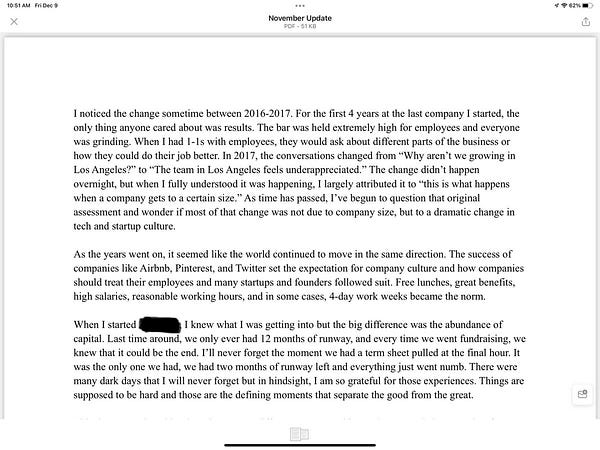
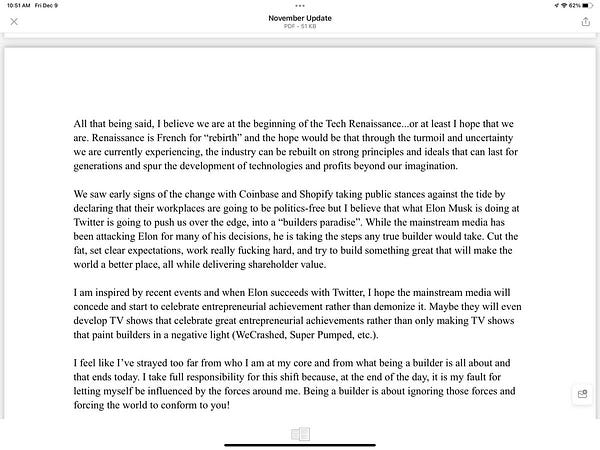
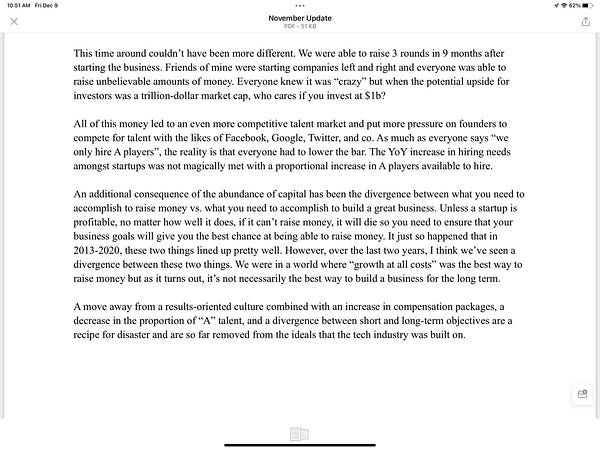

CEOs and managers alike are looking at what has happened at Twitter and have started reflecting, sometimes even praising, the management style of a relentless push for efficiency. And this isn't new for Elon. In the book The Founders, one of Musk's former employees, William Wu, reflects on Elon's style:
“[Workaholism] does no good for me as an employee, but then I feel like, if Elon does that at Tesla, then Tesla’s going to succeed no matter what. It’s painful to work with him as an employee—but as an investor in his company, it’s a wise decision.”
People are quick to point to Twitter's economic woes. Revenue is expected to have dropped from $5B in 2022 to $3B in 2023. Fidelity, who invested in Musk's Twitter take-private, have marked their investment down by 63.5% to $24B. Internally, Elon Musk seems to be taking an even more aggressive cut, indicating the company should be valued at ~$20B.
However, the decline is less a precipitous free fall akin to some other stocks we've seen, but rather a comparable decline to other social media companies (albeit more pronounced; call it an Elon Chaos Discount). Not to mention the company could be headed towards breakeven given the dramatic cost cutting. Dan Primack adds some context to Fidelity's markdown:
"Fidelity isn't necessarily privy to nonpublic information in making its determinations. Instead, it may be incorporating public market comps like Snap, which lost 66.1% of its market cap since April 25, 2022 (the day Musk signed his Twitter deal). Worth noting, however, that Snap's share price fell only 2.1% during February."
The reality is we don't know what's going to happen with Twitter. Will the current dumpster fire ultimately lead to the service's demise? Will Elon Musk pull off one of the greatest turnarounds in corporate history and bring Twitter into the upper echelons of social media giants like Facebook and YouTube? Juries out.
But what has really bummed me out is the vitriolic response to Elon Musk, both as an individual, and in particular his approach to work.
A Defense Nobody Asked For
As I reflected on the reaction to Elon Musk's efforts at Twitter, nothing bothered me more than this video from Adam Conover, a TikToker / TV host / comedian. A true creator of content. Here's his take on Elon Musk:
"Why is Elon Musk f**king this up so badly? Simple. His carefully crafted public image as a genius innovator has been a con from the very start. Elon didn't found Tesla. He used the money he got from co-founding PayPal (you know, the payment service that sucks) to buy a stake in Tesla. Then, he kicked out the original co-founder and stole his title, not to mention his car.
SpaceX does some cool sh*t. But they're a government space contractor that makes their money suckling at Uncle Sam's teat. And face it. Elon didn't design those rockets. He just brags about it on Twitter.
Elon is good at exactly three things: (1) trolling, (2) causing chaos, and (3) telling everyone he's a genius. And he does all those things on Twitter, which seems to be the only reason he bought it. And now that Elon runs Twitter, he's running it straight into the ground."
Elon Musk most certainly doesn't need me to defend him. And there's plenty about him that I wouldn't defend. Let me be clear. I'm no Elon Musk fanboy. I recognize that Elon has been riddled with frauds, sketchiness, grossness, and all sorts of character flaws. In fact, I think Elon Musk deserves much of the criticism and skepticism that is thrown his way. But when I hear things like this, they feel like a more context-specific version of the song about giving up, or the exasperation by the tech worker. Just an intense frustration and dismissal of the things that aren't working out for them.
PayPal was an important unlock in financial technology. Tesla is one of the only car companies to manage to survive after literally hundreds of failures since the invention of the car. SpaceX landed a goddamn rocket after it was launched. I can only take this bet to fruition if one of you (probably Elon) manages to invent a time machine, but I would bet every single dollar I have access to or have ever had access to or ever will have access to, that if you go back in time and take Elon Musk out of the equation you don't have Tesla. You don't have SpaceX.
And here's my bigger takeaway. If Elon Musk was setting out from the beginning to become the wealthiest person in the world, electric cars and rockets were NOT the obvious choice. Aren’t we glad that the richest person isn't Zuckerberg or Murdoch selling ads? Or SBF shilling fraud? Or Saudi oil tycoons doing... what they do?

When I think about a comedian being so vehemently dismissive of everything Elon Musk has done, I can't help but imagine the guy sitting on his couch eating donuts, watching the Olympics and commenting on how much these world-class athletes are "screwing it up." A more articulate way of thinking about it is the man in the arena poem.
Unfortunately, while the backlash against Twitter is the loudest and most emotional, it's certainly in line with the trend rather than an exception.
Techlash Rising
This isn't just a Twitter thing. You're seeing seemingly haphazard management tactics across companies of all shapes and sizes. HelloFresh implemented "forced performance management." Google laid off some employees that had worked at the company for 16+ years by just automatically locking their account without any heads up. In that Google layoff, the victim made a key point:
"This also just drives home that work is not your life, and employers -- especially big, faceless ones like Google -- see you as 100% disposable. Live life, not work."
Salesforce was criticized for telling employees they were like family, before promptly laying off 8K people. Marc Benioff went as far as to blame employees for their slacking output.
In 2022 we saw 160K+ people laid off in tech. We're only 3 months into 2023, and already we've seen 157K layoffs.
A company like Shopify grew from 5K to 10K people between the end of 2019 and the end of 2021; literally doubling the company in 2 years. A year after laying off 10% of their employees, Shopify's CEO is then tweeting about how you don't really need as many employees to generate revenue after all.
You see these dueling agendas where, on the one hand you have an increasingly frustrated mainstream of people who don't look at this as operational efficiency or complexity. They look at it as a rigged system established to keep them down. Go back to our satisfaction equation. People who feel completely limited in their ability to yield luck or meaningfulness to their advantage will start to give up on any desire to offer up effort.
But people don't just go into stasis. When they feel incapable of exerting effort towards their work, they become a black hole of anger and frustration, and they have to find a target for that. Increasingly, that is becoming work. Where they work. Who they work for. What they do for work. They become antagonistic towards all of it.
Die A Hero, Or Live Long Enough To Be The Villain
There is a sweeping and dangerous narrative around technology right now. When SVB failed, people around the country cried out to let it burn. Soon after, journalists were calling to euthanize VCs (figuratively... I hope.) OpenAI is going on a world tour to reassure people that AI isn't going to wipe out humanity (...we don't think).
In the famous Dark Knight clip that gave me the title of this section, they point to the Roman practice of electing one leader to take control in times of great need as a defense for a vigilante Batman. Unfortunately, the point is made the Caeser used that trust to take power, and never give it up.
Genuinely, many people consider technology as an industry to be the Caeser of progress. In a time of rapid acceleration, technology pushed itself to the center of human progress, and enticed the entire world to revolve around that vector. The rapid progress of technology, mapped to the cold, calculated reality of capitalism, and a declining justice system created a perfect world for people like Elon Musk to gain dramatic amounts of power, with significantly limited controls.
Some people look at that as a meritocratic success story. The most successful are the most rewarded. Others look at it as an unfair tipping of the scales. Something where the average person can succeed, but they can also use the system to pull the ladder up after they make their ascent.
But neither of those represent the frustrated masses. The people who are singing their kids lullabies about the futility of ambition. The people who are furious about SpaceX and consider it to be nothing more than a government leech. The workers who see no path to success other than making enough money to pay for antidepressants.
That group is depressed, anxious, frustrated, enraged, and increasingly uninspired. I think the outpouring of hatred from this group after the SVB crash woke some people up to the need that exists to defend technology against the criticisms of these detractors. Otherwise this narrative of technology, hard work, and success will crystallize as the villain that these frustrated masses want it to be.
Merits Of The Case: To Work? Or Not To Work?
The What
I think we should work harder than we do.
I think we should be more ambitious than we are.
I think we should seek to be more inspired than we are.
I think we should be more thoughtful of mental health, and fairness, and inclusion.
But we should also work to build for the sake of building. We should invent the future we want to see. We should seek to be intensely curious, and obsessively creative. We should dream more fervently than we currently do.
I think we should choose to pursue difficult things, "not because they are easy, but because they are hard."
The How
When I reflect on how we can do these things, I come back to Amjad's quote about a generation that doesn't want to work hard:
"I think the way to solve that problem is to inspire people. Inspire younger generations with the value of making something. We need some kind of spiritual reform. People need to understand that pleasure is such a fleeting thing. That's not the thing that makes life meaningful. There's so much consumption, and just being passive. A big part of diagnosing what is wrong with the world today is figuring out why so many people are super passive and not interested in doing anything really interesting."
We need to inspire people. We need to help people achieve visions that entice them. One of the most powerful implications of AI (for better of worse) is that it may very well wipe out 300M+ jobs. And from what we've seen of generative AI, it's not necessarily blue collar labor. It's design, software development, and more.
Amjad's call for a "spiritual reform" goes back to the death bed regrets. It's not about "being in the office" more; that's not the kind of work we need more of. It's the more meaningful regret: "I wish I’d had the courage to live a life true to myself, not the life others expected of me." How do we help people feel that courage? How do we awaken people? That is a pursuit worth building towards. Build something that inspires people.
Thanks to Eugenia and Amjad for jamming on this topic.
What Am I Reading?
Between Rest and Overdrive: Are Great Investors Lazy? by Frederik Gieschen
25% Loaded by Jack Raines
Technology Is Good Actually by Evan Armstrong
Treat your to-read pile like a river, not a bucket by Oliver Burkeman
The Adoption of AI Will Change the Software Value Chain by Erin Price-Wright
Brandon Sanderson Is Your God by Jason Kehe
Thanks for reading! Subscribe here to receive Investing 101 in your inbox each week:




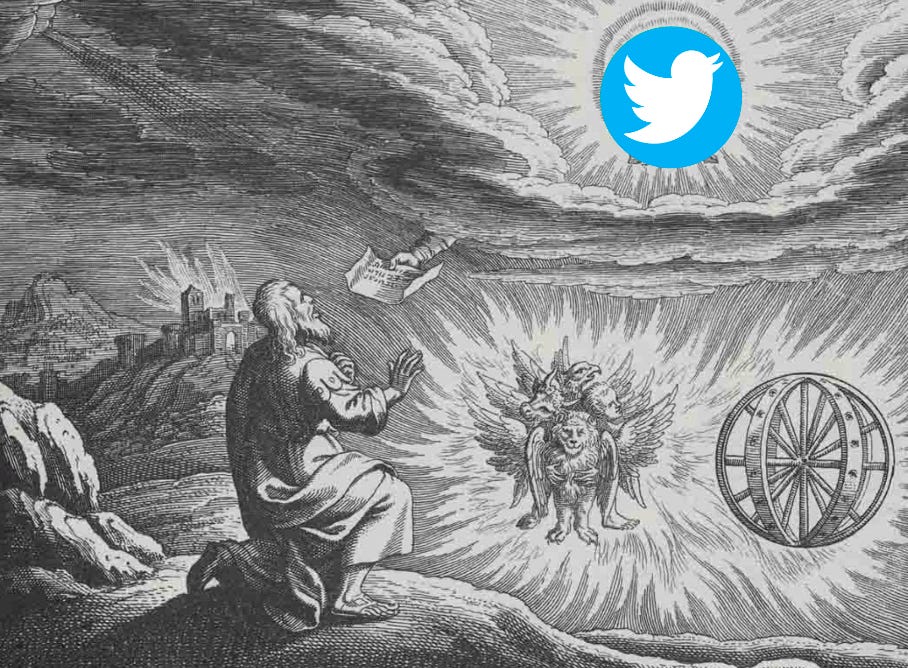
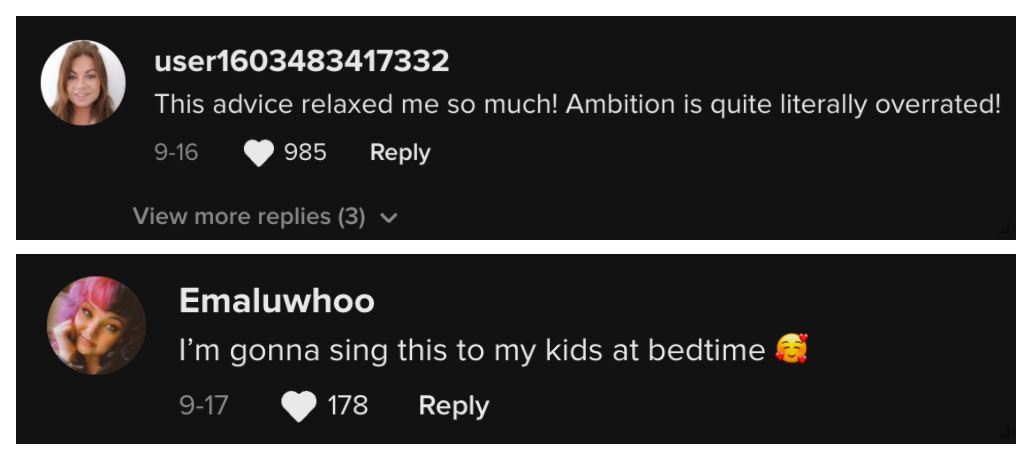


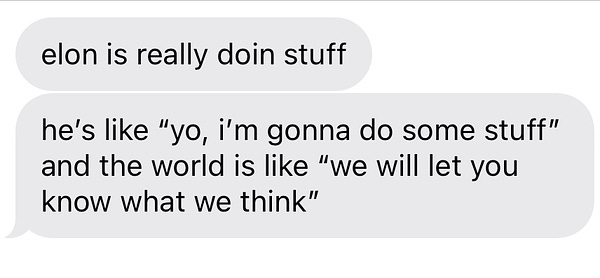

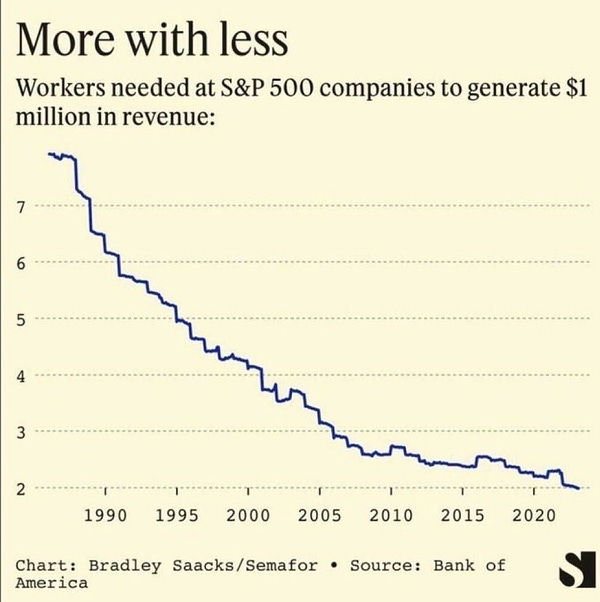
Fantastic post. Couldn't agree more. The perspective of work being a means to a materialistic end - buy the bigger house, get the 3rd car, make as much money as you can - has to stop. While we also live with the reality that many people truly struggle to make ends meet and support themselves + their family, we need more curiosity in the world. Curiosity begets inspiration, inspiration often results in uncovering new areas/topics to be curious about - the cycle repeats.
it is time to inject 'soul' in everything we do (and build). what. a. post. ✨✌️